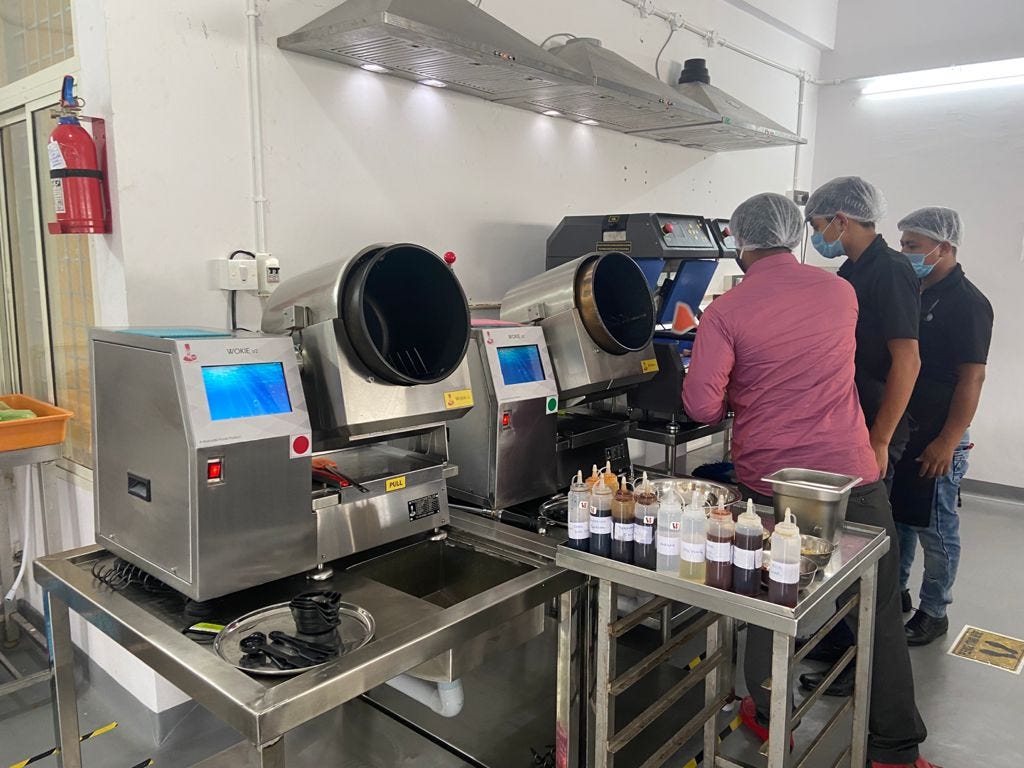So a White Tech Guy Wants to Make a Boba Tea Robot...
A Q&A with Boba-ntrepreneur Stacey Kwong, plus our new podcast!
Can anyone automate the production of any cuisine?
More specifically, should a white tech guy build a robot that makes boba tea, a drink borne out of the Asian community? Who should profit from such a machine, especially if that device has the potential to take jobs away from the very community it’s borrowing from?
This topic was actually broached by Darian Ahler, CEO of Bobacino and white tech guy, during my interview with him earlier this week. To Ahler’s credit, he is upfront about the hornet’s nest of issues around a white dude barging into the boba business. That’s one reason why he asked Stacey Kwong, Co-Founder of the Milk + T boba store chain, to be Bobacino’s Chief Boba Officer.
I had a really interesting conversation with Kwong this week about race, cultural appropriation, robots and boba. We talked about her initial reaction to Bobacino and Ahler, how she is working with the boba community, and what other robot startups can do to be mindful when automating the production of other culture’s cuisines.
The full Q&A with Kwong is available to paid OttOmate subscribers, but here’s a snippet from our conversation you might find interesting.
OTTOMATE: I’m just going to use [Darian’s] words here. He said he was a“white tech guy trying to step into an Asian community.” I’m wondering if you had any thoughts about that when you first met Darian and saw who was behind Bobacino?
KWONG: That wasn't my initial thought, but after hearing what they were talking about, and looking at the team, that thought did arise in my head. But the more I got to know Darian, the more I got to understand the project. I was like, ‘Okay, this is why they're contacting me because Darian is the robotics nerd.’ He knows nothing about boba and he's never claimed to know anything about boba, aside from how good it tastes. And that's why they reached out to not only me, but a lot of my friends as well in the boba industry. I guess they were trying to pick the right person. And I'm very fortunate they picked me.
But after you get to know the project a little bit, you sort of understand where they're coming from, and you realize, oh, this isn't just a white person trying to profit or make money off of our culture. This is just someone who kind of wants to help and bridge the gap between people who can't necessarily afford to start a full fledged brick and mortar versus someone who can maybe get their hands on a Bobacino kiosk. I think that's the message we want to send to people.
What do you think about issues of cultural appropriation and food robotics? What should startups do to be mindful of different cultures? How soon in the process should those steps happen? Leave a comment and share your thoughts.
Are you getting all of OttOmate?
Paid subscriptions help keep the lights on here at OttOmate, so consider becoming a full member. In addition to more news and analysis, paid subscribers get early access to our podcast (see below), invites to exclusive events and more!
Podcast! Mukunda Foods is Building its own robot-powered ghost kitchens
OttoMate podcasts are up and running! Just search for OttOmate in your favorite podcast player (I’m still sorting through a few syndication hiccups like artwork, so please bear with me.)
My conversation with Dibyananda Brahma, VP of Growth at Mukunda Foods is now available to everyone. Based in Bangalore, India, Mukunda Foods makes a variety of automated appliances for restaurant kitchens: Biryani-bots, woks, fryers, etc.
As Brahma explains, Mukunda is embarking on a new endeavor that he believes will help the company achieve scale faster. Instead of selling one or two robots to restaurants individually, Mukunda is building out its own global network of ghost kitchens. Mukunda will then offer this “Kitchen-as-a-Service” to many restaurants at once. All the participating restaurants need to do is provide their menus, and Mukunda will accordingly program their robots. And because Mukunda’s ghost kitchens are heavily automated, they don’t require a lot of people to operate.
In addition to ghost kitchens, Brahma discusses “idiot proof” robot design, and what specific labor issues restaurants in India face.
More Cheesey Goodness
Paid subscribers get access to this week’s podcast, a talk with Piestro CEO, Massimo Noja De Marco. In our chat, De Marco explains how his robot can save pizzerias $60,000 a year just in cheese. That’s, a lot of cheddar… (ed. note: all OttOmate subscribers get dad jokes!)
More Headlines
Tiny Mile, Big Robot Delivery Robot Ambitions - Meet Toronto’s very cute and very pink semi-autonomous rover.
Walmart to Launch Self-Driving, Last-Mile Delivery with Ford and Argo AI - The retail giant is also an investor in GM-owned autonomous startup, Cruise.
Bobacino's Boba Tea 'Bot Will Let You Pay with Your Face - You don't have to, but it'll be available.
Curb Appeal. Ottonomy's Robots are Also Getting in on Grocery Order Pickup - We are sensing a last meter BOPIS trend
Thanks for reading!
Stay cool. Have a great summer. Class of ‘90 rulez.









Thanks for being racist.